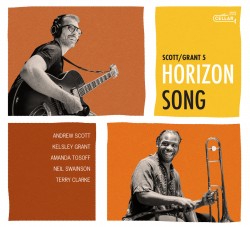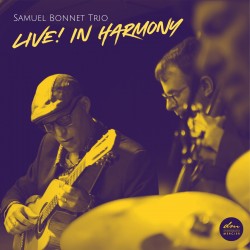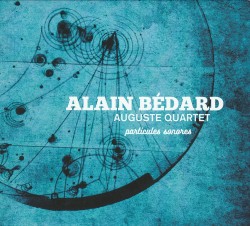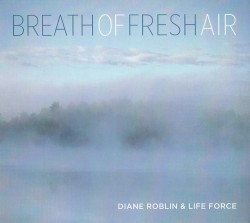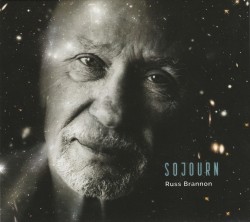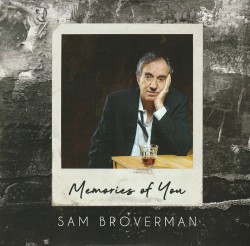Something in the Air | Multiple Musical Sets Celebrate Different Milestones and Achievements - June 2025
Only a vanity project if designed that way, multiple recordings from a single artist can offer more than collating obscure or famous souvenirs of a storied career or celebrating a brace of hits. When it comes to creative music, multiple discs give the creator more space to showcase original music in one package and a chance for the listener to hear in complete detail perspectives the individual innovator wishes to present. Dealing with musical auteurs here, each of these sets serve a different purpose. One is new music attached to receiving an important artistic honour. Another presents different tranches of a musician’s oeuvre as he celebrates an important age milestone. The third collects idiosyncratic performances of wholly original music.
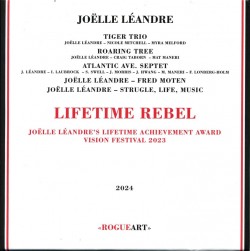 Honouring her as the first non-American recipient of the Lifetime Achievement award presented annually by New York’s Vision Festival Lifetime Rebel (RogueArt ROG-0137 rogueart1.bandcamp.com/album/lifetime-rebel) assembles concerts from French bassist Joëlle Léandre. Three CDs recorded during the 2023 festivities feature her with her Tiger Trio of flutist Nicole Mitchell and pianist Myra Melford; on another with her Roaring Tree group with pianist Craig Taborn and violist Mat Maneri; and a third matches her bass and voice with the spoken words of Fred Moten. Another disc, presenting her Atlantic Ave. Septet, was recorded six months later in France with trombonist Steve Swell, tenor/soprano saxophonist Ingrid Laubrock, violinist Jason Hwang, violist Maneri, cellist Fred Lonberg-Holm and guitarist Joe Morris. Interestingly enough, every other player featured is American. These international connections and her unique role in the music world are touched on, along with other subjects in the included DVD where Léandre, who will be 74 this year, is interviewed about her long career with first notated and then improvised music, interspaced with bass solos.
Honouring her as the first non-American recipient of the Lifetime Achievement award presented annually by New York’s Vision Festival Lifetime Rebel (RogueArt ROG-0137 rogueart1.bandcamp.com/album/lifetime-rebel) assembles concerts from French bassist Joëlle Léandre. Three CDs recorded during the 2023 festivities feature her with her Tiger Trio of flutist Nicole Mitchell and pianist Myra Melford; on another with her Roaring Tree group with pianist Craig Taborn and violist Mat Maneri; and a third matches her bass and voice with the spoken words of Fred Moten. Another disc, presenting her Atlantic Ave. Septet, was recorded six months later in France with trombonist Steve Swell, tenor/soprano saxophonist Ingrid Laubrock, violinist Jason Hwang, violist Maneri, cellist Fred Lonberg-Holm and guitarist Joe Morris. Interestingly enough, every other player featured is American. These international connections and her unique role in the music world are touched on, along with other subjects in the included DVD where Léandre, who will be 74 this year, is interviewed about her long career with first notated and then improvised music, interspaced with bass solos.
While the interaction with Moten gives Léandre a chance to demonstrate her immediate response to poetic prompts, Moten’s citing of various jazz heroes within his stream of consciousness, seemingly disjointed tales about neighborhoods, travel and relationships don’t really connect to Léandre’s sounds. His poetics seem more fanciful than logical. Moten singing a snatch of Lush Life comes across as less musical than the yells and yodels Léandre appends to her string improvisations that reach an early climax as she mumbles and string bumps to underline his salute to other bass playing avatars.
More balanced, the Tiger Trio improv is swifter and tougher with pieces starting from a connective centre and moving outwards. Mitchell’s transverse arabesques growl and trill with the same finesse; her highest notes resembling human vocals while her thickened quavers balance the bassist’s sul ponticello strokes, which sometimes appear to slice the strings and wood like a sharp axe blade. Melford’s measured comping means that connection and expression are never lost and her quick key clips and tingles are dynamic enough to cement forward motion even as Mitchell peeps and Léandre vocally whoops, mumbles and pants.
The Roaring Tree trio’s set of improvised chamber music is involved in contrapuntal expositions involving intense keyboard leaps on one side and buzzing pitches from the bass and viola on the other. Maneri’s strident clipping and spiccato slashes decorate the four tracks’ top layer while Léandre’s responsive buzzes maintain the bottom. Everything comes to a head on Roaring Tree #4 where the set’s finale involves moving a portamento piano turnaround into pedal point with vital arco extensions from the others, as the exposition moves from andante to allegro to prestissimo.
Latterly, the Atlantic Ave. Septet’s nearly 43-minute performance of Atlantic Ave. #1 captures a fully realized composition by the bassist which uses the ensemble's capabilities to broaden the piece which reflects aspects of her musical persona. Bisected by several tutti interludes during which the players ascend the scale with confidence, the polyphonic movement encompasses harmonized, almost romantic sequences with space for individual expression. Although the five string players sometimes move as a block, a jazz-like walking bass line and harsh col legno string banging arise solely from the cellist and bassist. Hwang and Maneri alternate between swelling unison strokes and aviary squeaks. Swell’s plunger tones roughen up any string cushioning as do Laubrock’s thin soprano sax squeaks. Despite sections of cacophony, Léandre and Swell combine for a break that’s almost baroque, while the saxophonist’s tenor contributions inject an element of modern jazz into the piece. Beside her distinctive tough wood smacks and pizzicato pacing, by the conclusion the bassist vocalizes her now familiar Bedlam-style grumbles and faux operatic bel canto cries. Confirming the individuality of her composition, this quirk is manifest seven-fold at the beginning, the end and at mid-point as all the musicians vocally mutter, yell, gurgle, laugh and hector before circling back to their instruments.
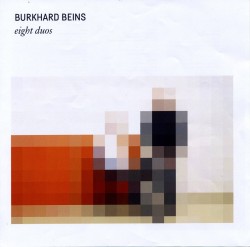 Significant birthdays can also be a reason for exploratory musicians to reflect on their legacy. To celebrate his 60th birthday last year Berlin-based composer/improviser Burkhard Beins has released Eight Duos (Ni Vu Ni Connu LP 053-055 nivuniconnu.bandcamp.com/album/eight-duos), whose eight selections feature his collaboration with a cross section of the city’s other sound makers. Beins, who also creates sound installations, has for decades been involved in the German capital’s evolving Echtzeitmusik or real-time music scene. Here he varies his instrumentation on every track bringing out an amplified cymbal, bass drum, snare drum, drum kit, analog synthesizers, walkie talkie and samples at various times, with his partners playing acoustically or heavily involved with electronics. Unleash with pianist Quentin Tolimieri, is probably the closest to jazz. Using a full kit Beins’ echoes and rattles complement the pianist’s linear dynamics that slide down the scale and then reverse in such a manner that Tolimieri’s sudden stops and hammered keys end up as percussive as Beins’ beats. In contrast Transmission, where Beins’ synthesizer and samples are interlaced with the antennas, receivers and tape machines of Italian Marta Zapparoli, is solely affiliated to voltage. The rugged oscillations by both distend to mirrored affiliations which centre on extensive textures that commingle as widening electric lawnmower-like drones and unvarying rumbles are only infrequently pierced by suction-like projections, muffled rocket-launching explosions, airy whooshes and backwards flanges and shakes. The result is almost opaque until the final dissolve. Still the most characteristic duets involve two individual Echtzeitmusik theoreticians: idiosyncratic trumpeter Axel Dörner and Andrea Neumann, who plays inside piano and mixing board. Initially low key, Expansion blends board hisses and reverb with Neumann’s careful string slides that meld tolling, buzzing and clipped timbres. Beins’ isolated cymbal vibrations and strained scratches end with reverberations sounding like distant thunder. The joint murmurs simultaneously suggest vibrant colours and crepuscule. A variant of this, Dörner’s technique on Unlock is to never emphasize a whole note but instead create brass architecture from half valve spits, hollow strains, toneless breaths, growly smears and distant whistles. Occasionally side snare scratches and foreshortened drum top rubs match up with trumpet strategy combining tongue and palm percussion sizzles.
Significant birthdays can also be a reason for exploratory musicians to reflect on their legacy. To celebrate his 60th birthday last year Berlin-based composer/improviser Burkhard Beins has released Eight Duos (Ni Vu Ni Connu LP 053-055 nivuniconnu.bandcamp.com/album/eight-duos), whose eight selections feature his collaboration with a cross section of the city’s other sound makers. Beins, who also creates sound installations, has for decades been involved in the German capital’s evolving Echtzeitmusik or real-time music scene. Here he varies his instrumentation on every track bringing out an amplified cymbal, bass drum, snare drum, drum kit, analog synthesizers, walkie talkie and samples at various times, with his partners playing acoustically or heavily involved with electronics. Unleash with pianist Quentin Tolimieri, is probably the closest to jazz. Using a full kit Beins’ echoes and rattles complement the pianist’s linear dynamics that slide down the scale and then reverse in such a manner that Tolimieri’s sudden stops and hammered keys end up as percussive as Beins’ beats. In contrast Transmission, where Beins’ synthesizer and samples are interlaced with the antennas, receivers and tape machines of Italian Marta Zapparoli, is solely affiliated to voltage. The rugged oscillations by both distend to mirrored affiliations which centre on extensive textures that commingle as widening electric lawnmower-like drones and unvarying rumbles are only infrequently pierced by suction-like projections, muffled rocket-launching explosions, airy whooshes and backwards flanges and shakes. The result is almost opaque until the final dissolve. Still the most characteristic duets involve two individual Echtzeitmusik theoreticians: idiosyncratic trumpeter Axel Dörner and Andrea Neumann, who plays inside piano and mixing board. Initially low key, Expansion blends board hisses and reverb with Neumann’s careful string slides that meld tolling, buzzing and clipped timbres. Beins’ isolated cymbal vibrations and strained scratches end with reverberations sounding like distant thunder. The joint murmurs simultaneously suggest vibrant colours and crepuscule. A variant of this, Dörner’s technique on Unlock is to never emphasize a whole note but instead create brass architecture from half valve spits, hollow strains, toneless breaths, growly smears and distant whistles. Occasionally side snare scratches and foreshortened drum top rubs match up with trumpet strategy combining tongue and palm percussion sizzles.
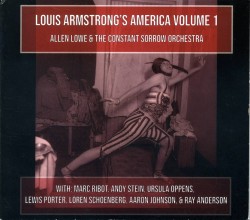 The oddest sessions here are the two-volume four-disc Louis Armstrong’s America Vol. 1 and Vol. 2 (ESP 5109/5110 allenloweesp.bandcamp.com/album/louis-armstrongs-america) performed by tenor saxophonist Allen Lowe & the Constant Sorrow Orchestra. Despite what the title may suggest this isn’t a salute to Satchmo’s music, but instead 69 unique tunes composed by Lowe that mix the styles of jazz created during Armstrong’s lifetime (1901-1971). Played by a total of 24 musicians in different small groups, the postmodern performances feature variations of every style from Classic Jazz to Free Jazz, with pivots into blues and tinges of rock.
The oddest sessions here are the two-volume four-disc Louis Armstrong’s America Vol. 1 and Vol. 2 (ESP 5109/5110 allenloweesp.bandcamp.com/album/louis-armstrongs-america) performed by tenor saxophonist Allen Lowe & the Constant Sorrow Orchestra. Despite what the title may suggest this isn’t a salute to Satchmo’s music, but instead 69 unique tunes composed by Lowe that mix the styles of jazz created during Armstrong’s lifetime (1901-1971). Played by a total of 24 musicians in different small groups, the postmodern performances feature variations of every style from Classic Jazz to Free Jazz, with pivots into blues and tinges of rock.
 A writer as well as a musician Lowe whose career sideline for cancer treatment is referenced throughout with multiple versions of the non-sentimental ballad I Should Have Stayed Dead, reflects his POMO orientation in quirky song titles which are inside jokes for jazz fans. Duke Ellington’s Black and Tan Fantasy becomes Black and White Fantasy and a jolly march with Ray Suhy’s clanking banjo, Aaron Johnson’s slippery clarinet and Frank Lacy’s muted trumpet prominent. Hello Dali, a contrafact of Hello Dolly, joins synthesizer gurgles, some bebop licks and ends with the famous few notes from Beethoven’s Fifth Symphony. Under the Weather, a take off on Armstrong and Earl Hines’ Weatherbird, rolls along with pianist Loren Schoenberg emulating Hines’ swift and splattering patterns and Lowe’s slippery Swing Era sax solo. A salute to an early ragtime popularizer Mr. Harney Turn Me Loose has pianist Matthew Shipp melding his free jazz timing to a raggy beat; while Shufflin’ The Deck (Take 5, Please) turns the Dave Brubeck quartet’s Take Five into a simple shuffle as Johnson languidly and pianist Jeppe Zeeberg vigorously create a Bizarro version of Brubeck/Paul Desmond duets. When Dave Schildkraut Goes Marching In blends When The Saints featuring slap bass and banjo with hard tenor sax riffs and bass drum accents in the style of the obscure bop saxophonist of the title. Meanwhile guitarist Marc Ribot adds his searing rock-blues flanges on tunes like Riot On The Sunset Strip – named for the 1967 drug exploitation film – where Lowe quotes Lonely Avenue within his slurpy, honking solo. Trombonist Ray Anderson comes across as the session’s MVP, adding modernized gutbucket slurs and rippling tailgate extensions mated with Johnson’s clarion Trad clarinet on Back Home Rag; and contrasts his basement plunger tones with tap-dancing like drumming on Mr. Jenkins Lonely Orphan Band a take off on both Sgt. Pepper's and the New Orleans orphanage band where Louis Armstrong learned to play cornet. There’s even a sly salute to modern notated music with John Cage Turns the Page (or: 3:02) where Lowe and company burlesque Cage’s infamous “silent” piece by shaking loosened strings, slapping piano wood, muffle drum pops, advance brief reed cries and above all noisily shred and crunch paper.
A writer as well as a musician Lowe whose career sideline for cancer treatment is referenced throughout with multiple versions of the non-sentimental ballad I Should Have Stayed Dead, reflects his POMO orientation in quirky song titles which are inside jokes for jazz fans. Duke Ellington’s Black and Tan Fantasy becomes Black and White Fantasy and a jolly march with Ray Suhy’s clanking banjo, Aaron Johnson’s slippery clarinet and Frank Lacy’s muted trumpet prominent. Hello Dali, a contrafact of Hello Dolly, joins synthesizer gurgles, some bebop licks and ends with the famous few notes from Beethoven’s Fifth Symphony. Under the Weather, a take off on Armstrong and Earl Hines’ Weatherbird, rolls along with pianist Loren Schoenberg emulating Hines’ swift and splattering patterns and Lowe’s slippery Swing Era sax solo. A salute to an early ragtime popularizer Mr. Harney Turn Me Loose has pianist Matthew Shipp melding his free jazz timing to a raggy beat; while Shufflin’ The Deck (Take 5, Please) turns the Dave Brubeck quartet’s Take Five into a simple shuffle as Johnson languidly and pianist Jeppe Zeeberg vigorously create a Bizarro version of Brubeck/Paul Desmond duets. When Dave Schildkraut Goes Marching In blends When The Saints featuring slap bass and banjo with hard tenor sax riffs and bass drum accents in the style of the obscure bop saxophonist of the title. Meanwhile guitarist Marc Ribot adds his searing rock-blues flanges on tunes like Riot On The Sunset Strip – named for the 1967 drug exploitation film – where Lowe quotes Lonely Avenue within his slurpy, honking solo. Trombonist Ray Anderson comes across as the session’s MVP, adding modernized gutbucket slurs and rippling tailgate extensions mated with Johnson’s clarion Trad clarinet on Back Home Rag; and contrasts his basement plunger tones with tap-dancing like drumming on Mr. Jenkins Lonely Orphan Band a take off on both Sgt. Pepper's and the New Orleans orphanage band where Louis Armstrong learned to play cornet. There’s even a sly salute to modern notated music with John Cage Turns the Page (or: 3:02) where Lowe and company burlesque Cage’s infamous “silent” piece by shaking loosened strings, slapping piano wood, muffle drum pops, advance brief reed cries and above all noisily shred and crunch paper.
Multiple sets can be used by musicians to celebrate honours, notable age milestones or to express multiple ideas without having to précis a musical vision. All are equally valid.


